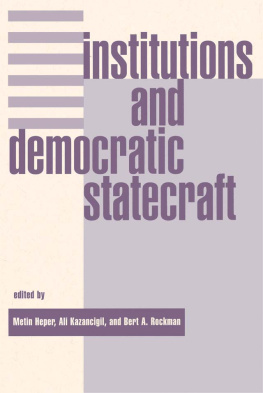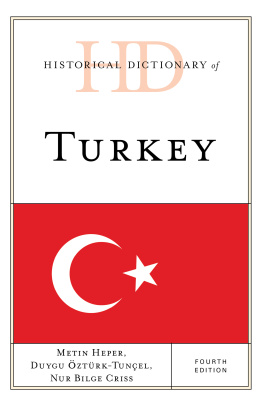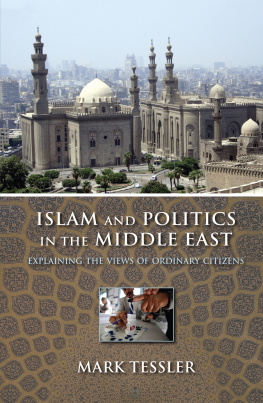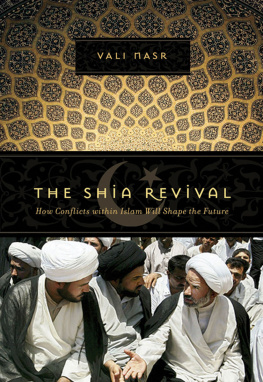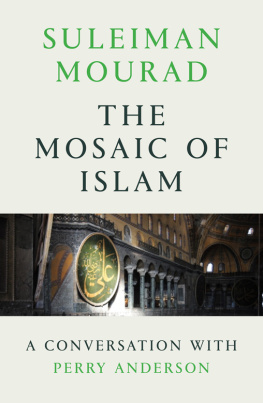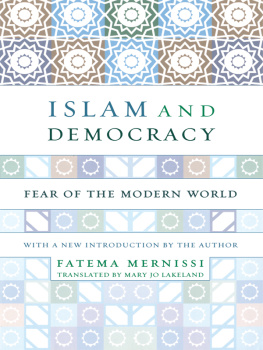ROUTLEDGE LIBRARY EDITIONS: POLITICS OF ISLAM
ISLAM AND POLITICS IN THE MODERN MIDDLE EAST
ISLAM AND POLITICS IN THE MODERN MIDDLE EAST
Edited by
METIN HEPER AND RAPHAEL ISRAELI
Volume 2
First published in 1984
This edition first published in 2013
by Routledge
2 Park Square, Milton Park, Abingdon, Oxon, OX14 4RN
Simultaneously published in the USA and Canada
by Routledge
711 Third Avenue, New York, NY 10017
Routledge is an imprint of the Taylor & Francis Group, an informa business
1984 Metin Heper and Raphael Israeli
All rights reserved. No part of this book may be reprinted or reproduced or utilised in any form or by any electronic, mechanical, or other means, now known or hereafter invented, including photocopying and recording, or in any information storage or retrieval system, without permission in writing from the publishers.
Trademark notice: Product or corporate names may be trademarks or registered trademarks, and are used only for identification and explanation without intent to infringe.
British Library Cataloguing in Publication Data
A catalogue record for this book is available from the British Library
ISBN: 978-0-415-64437-2 (Set)
eISBN: 978-0-203-07906-5 (Set)
ISBN: 978-0-415-83074-4 (Volume 2)
eISBN: 978-0-203-38143-4 (Volume 2)
Publishers Note
The publisher has gone to great lengths to ensure the quality of this reprint but points out that some imperfections in the original copies may be apparent.
Disclaimer
The publisher has made every effort to trace copyright holders and would welcome correspondence from those they have been unable to trace.
ISLAM AND POLITICS IN THE MODERN MIDDLE EAST
Islam and Politics in the Modern Middle East
Edited by
Metin Heper and Raphael Israeli
1984 Metin Heper and Raphael Israeli
Croom Helm Ltd, Provident House, Burrell Row,
Beckenham, Kent BR3 1AT
Croom Helm Australia Pty Ltd,
First Floor,
139 King Street, Sydney,
NSW 2001, Australia
British Library Cataloguing in Publication Data
Islam and politics in the modern Middle East.
1. Islamic countries Politics and government
I. Heper, Metin II. Israeli, Raphael
320.917671 DS35.6
ISBN 0709912897
Typeset by Leaper & Gard Ltd, Bristol
Printed and bound in Great Britain
by Billing & Sons Limited, Worcester.
CONTENTS
This volume is dedicated to the memory of Professor Gabriel Baer of the Hebrew University, who was a driving force behind it but did not live to see it completed.
We are grateful to the officials of many institutions who have provided a congenial and supportive atmosphere while the work on this volume was being carried out. Among them are Professors Harold Z. Schiffrin and the late Gabriel Baer of the Harry S. Truman Research Institute for the Advancement of Peace, the Hebrew University of Jerusalem; Professors zer Ertuna, stn Ergder and idem Katba of Boazii University, Istanbul; and Professors Howard Reed, Rudolph L. Tkes, Ramon Knaurhase and David E. Repass of the University of Connectitut.
We would also like to thank the Publications Department of the Truman Institute and its director, Norma Schneider, for undertaking to see that this volume was prepared for press as quickly and efficiently as possible; we also thank Helene Hogri for her editorial assistance.
Metin Heper and
Raphael Israeli
ISLAM, POLITICS AND CHANGE IN THE MIDDLE EAST
Metin Heper
Instead of talking in a general way about tradition and its unfolding, one must attempt to distinguish systematically between different aspects of what has often been called tradition and to analyze their relation to social structure and organization. Only insofar as one takes into account the interaction between the various aspects of tradition, as they influence the activities of different groups and societies in the new modern settings, can one analyze the dynamics of the construction of post-traditional orders in their social, political, and cultural dimensions.1
In the traditional approach to modernization tradition was taken in a general way. Its various dimensions were lumped together into an undifferentiated entity. In line with the assumption of a zero-sum relationship between modernity and tradition the role of tradition in society was expected to recede in time.2 Recently this view has been criticized. It is now understood that the new does not necessarily eradicate the old, and that traditional symbols and institutions persist through many historical changes. It is further argued that the symbols and institutions in question do not necessarily have a dysfunctional impact upon the modernization process; on the contrary, in many instances they continue to have crucial functions within modernized societies.3
Some notable examples aside,4 studies of religion and politics constitute one of the areas least affected by this new paradigmatic reorientation. This is particularly true of analyses of Islam and politics. One may hazard a guess that so-called Orientalism must have played a significant role here. There is a remarkable affinity between the traditional approach to modernization, which perceived tradition as an undifferentiated entity having an almost total structuring effect upon society, and Orientalism, which pictured Muslim people as acting always as Muslims and nothing else.5
The latter notion has been elaborated by such leading students of the history and sociology of Islam as Lewis, Nieuwenhuijze and Hodgson. Lewis once observed:6
To the modern Western mind, it is not conceivable that men would fight and die in such great numbers over mere differences of religion; there have to be some other genuine reasons underneath the religious veil. This is reflected in the present inability, political, journalistic, and scholarly alike, to recognize the importance of the factor of religion in the current affairs of the Muslim world and in the consequent recourse to the language of left-wing, right-wing, progressive and conservative, and the rest of the Western terminology.
In a complementary fashion Nieuwenhuijze has claimed that:7
There exists such a thing as the perennial specificity of the Middle East as a culture area The basic notion [is that], mans role in the universe is to maintain, and in extreme cases to reconstitute, an assumedly pre-established cosmos, an order that is metaphysically correct, divinely sanctioned Islam thus appears as a full way of life. Interiorized, it appears as faith underpinning action.
Finally, Hodgson saw Islam as personal conscience an irreducible entity uncontaminated by sociological factors which as such, creates an external impersonal civilization.8
As I have indicated elsewhere,9 the line of reasoning here, reduced to its bare essentials, seems to run as follows: In the last analysis, Islam is a mysterious force. From time to time it decides to act. When exactly this occurs is also mysterious, because such an impulse is unaffected by social, economic or political factors.





